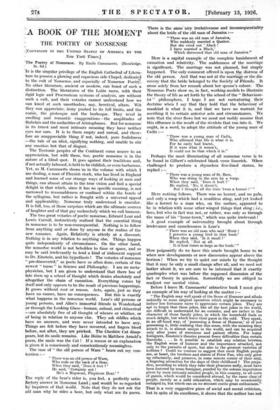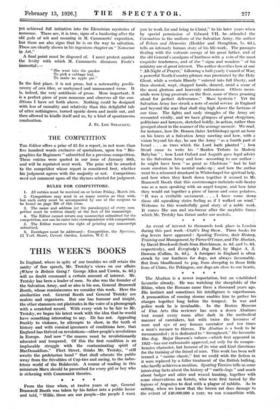:A BOOK OF THE MOMENT
THE POETRY OF NONSENSE
4COPYRIGHT
IN THE UNITED STATES OF AMERICA BY THE
Nete York Times.] •
The Poetry
of Nonsense. By Emile Cammaerts. (Routledge.
• 3s. 6d.)
'IT is the singular privilege of the English Cathedral of Litera- ture to possess a glowing and capacious side Chapel, dedicated
to the cult of Nonsense, and especially of Nonsense Poetry. No other literature, ancient or modern, can boast of such a distinction. The literatures of the Latin races, with their rigid logic and Procrustean systems of analysis, are without such a cult, and their votaries cannot understand how we can kneel at such unorthodox, nay, heretical, altars. Wit they can appreciate, irony pushed to its full limits, and the comic, the grotesque and the burlesque. They revel in swelling and romantic exaggerations—the amplitudes of 'Rabelais and the audacities of Aristophanes. But for nonsense in its truest and most intimate meaning they have neither eyes nor ears. It is to them empty and unreal, and there- fore an unappreciable thing if not, indeed, pure foolishness —the tale of an idiot, signifying nothing, and unable to stir any emotion but that of disgust.
• The Teutonic peoples of the Continent come nearer to an appreciation, but with them, too, poetic nonsense is in the nature of a blind spot. It goes against their traditions and, if not actually tabooed, is held to be childish, or even barbarous. Yet, as M. Cammaerts shows us in the volume with which I am dealing, a man of Flemish stock, who has lived in England and learned some of our strange ways of looking at men and things, can almost attain to the true vision and find a special delight in that which, since it has no specific meaning, is not narrowed to reasonableness or confined within the bonds of the syllogism, but rather is fraught with a universal appeal and applicability. Nonsense truly understood is oracular.
It is full, too, of those surprises which are the ultimate sources of laughter and of that gay melancholy which we call humour.
The two great votaries of poetic nonsense, Edward Lear and Lewis Carroll, instinctively realized that the essential thing in nonsense is to be non-consequential. Nothing is to follow from anything said or done by anyone in the realms of the
new romance. Again, Relativity, is utterly at a discount.
Nothing is in any relation to anything else. Things happen quite independently of circumstance. On the other hand, the nonsefise world is not beholden to time or space, and so may be said irrelevantly to lend a kind of iridescent support to Dr. Einstein, and his hypothesis The votaries of nonsense "pre-discovered," as poets have so often done, certain of the newest " turns " in Science and Philosophy. I am no meta- physician, but I am given to understand that there has of late risen up a school of thought which denies absolutely and :altogether the chain of causation. Everything comes by
itself and only appears to be the result of previous happenings. It grows without root or reason. Acts, again, just as they have no causes, have no consequences. But this is exactly
what happens in the nonsense world. Lear's old persons or young persons. and Alice's immortal friends in Wonderland or through the Looking Glass—human, animal, and chimerical
—are absolutely free of all thought of whence or whither, or of being in relation to anyone' else. They ask riddles which have no answers, and were never intended to have any. Things are felt before they have occurred, and fingers bleed
before, not after, they are pricked. The Cheshire Cat disap- pears, but its smile remains. Like Heine in Matthew Arnold's poem, the smile was the Cat ! If a reason or an explanation is given it is consciously and conscientiously meaningless.
The case of "the old person of Ware" bears out my con- tention :—
"There was an old person of Ware,
Who rode on the back of a Bear.
When they said, Does it trot ? '
• lie said, " Certainly not !
He's a Mopsican, Flopsican Bear.'" - The reply of the bear's rider is, you feel, a perfectly satis- Factory answer in Nonsense Land ;. and_ vioulki. be so regarded by Inquirers of that world. Note that they do not ask the old man why he rides a bear, but only what are its paces. 'There is the mime 'airy irrelativeness and inconseqUentiality about the bride of the old man of Jamaica :— "There was an old man of Jamaica,
Who suddenly married a Quaker.
But she cried out Mack !
I have married a Black,'
Which distressed that old man of Jamaica.'
Here is a capital example of the complete banishment, of causation and relativity. The suddenness of the marriage is significant. The marriage was not planned, but simply happened. The only comment offered is upon thp distress of the old person. And that was not at the marriage or the as- covery that the bride belonged to the Society of Friends. It arose solely from her remark about her spouse's colour. The Nonsense Poets show us, in fact, working models to illustrate the theory of life as set forth by the school of the" Behaviour- ist" philosophers. I hope I am not caricaturing their doctrine when I say that they hold that the behaviour of mankind is what it is, and that we have no warrant for ascribing it to certain anterior acts and circumstances. We note that the river flows but we must not rashly assume that this effluence is the result of the rivulets that run into it. We ought, in a word, to adopt the attitude of the young maxi of
Cadiz :—
" There was a young man of Cadiz, Who affirmed that life is what it is. For he early had learnt,
If it were what it weren't, It could not be that which it is."
Perhaps the most illuminating of all nonsense verse is. to be found in Gilbert's celebrated blank verse limerick. When challenged to produce a rhymeless five-lined stanza, he replied
"There was a young man of St. Bees, Who was stung in the arm by a wasp. When they said, Does it hurt ? '
• He replied, No, it doesn't,
But I thought all the time 'twas a hornet ! ' " Here nothing follows. There was no hornet, and no pain, and only a wasp which had a resultless sting, and yet looked like .a hornet to a man who, on the surface, appeared to be in relation with some other winged things that sting ; i.e., bees, but who in fact was not, or rather, was only so through the name of his "home-town," which was quite irrelevant !
A good example of universality brought about through irrelevance and causelessness is Lear's
"There was an old man who said Hush !
I perceive a young bird in that bush.'
When they said, 'Is it small ? '
He replied, Not at all. It is four times as large as the bush.'"
How poignantly do we have this oracle brought home to us when new developments or new discoveries appear above: the horizon ! When we try to quiet our minds by the thought that it may be only a small change after all, and we need not bother about it, we are sure to be informed that it exactly quadruples what was before the supposed dimension of .the fact or theory in question. Sorrowfully we are obliged , to readjust our mental vision.
Before I -leave M. Cammaerts' attractive book I must give an example of his way of looking at the matter :—
"The English may well speak of the Sense of Humour and allude unkindly to some surgical operation which might be necessary to induce less fortunate races to appreciate certain jokes. They are apt to forget that these jokes, like all the best jokes in the world, are difficult to understand for an outsider, and are rather in the character of those family jokes, in which the household finds so much delight, but which leave their guest in the cold. They speak, in an off-hand way, of possessing a Sense of Humour,' or of not possessing it, little realizing that this sense, with the meaning they attach to it, is almost unique in the world, and can be acquired only after years of strenuous and patient efforts. For many foreigners, Einstein's theories present fewer difficulties than certain limericks.. . . Is it possible to establish any relation betvfeen the Rnglish sense of humour and the importance attached, not only to the pursuits of sport, but also to the greatest varieties of hobbies ? Could we venture to suggest that most English people are, at heart, the brothers and sisters of Peter Pan, who only grow up reluctantly, and preserve, in some remote corner of their soul, a lingering attraction for the days of their childhood ? The preju- dice, according to which they take their pleasures sadly, must have been fostered by some foreigner, puzzled by the solemn importance given by most seriously-minded people, in this country, to all sorts of games, which would be considered abroad, by the same class of people, merely as a mild relaxation, which may be occasionally mdulged in but which-canon no account' excite great enthusiasm.'
That is a very suggestive piece of social and moral criticism, but in spite of its excellence, it shows that the author has not yet achieved full initiation into the Eleusinian mysteries of nonsense. There are, it is true, signs of a hankering after the bld gods of wit and meaning in M. Cammaerts' exposition, but there are also signs that he is on the way to salvation. These are clearly shown in his ingenious chapter on " Nonsense
in Art." • A final point must be disposed, of. I must protest against the levity with which M. Cammaerts dismisses Foote's immortal :— "She went into the garden To pick a cabbage leaf, To make an apple pie."
In the first place, it is not prose, but a noteworthy predis- covery of vers libre, or unrhymed and unmeasured verse. It is, indeed, the very antithesis of prose. More important, it is a perfect piece of pure nonsense and observes all the con- : ditions I have set forth above. Nothing could be designed with less of causality and relativity than this delightful tale of utter nothingness, turned upside down and inside out, and then allowed to kindle itself and us, by a kind of spontaneous combustion.
J. ST. Lou STRACHEY.



















































 Previous page
Previous page